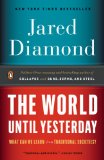Summary | Excerpt | Reviews | Beyond the Book | Read-Alikes | Genres & Themes | Author Bio

What Can We Learn from Traditional Societies?
by Jared DiamondThis article relates to The World Until Yesterday
Jared Diamond's question, "What can we learn from traditional societies?" is one Westerners have been asking in a Utopian spirit for generations, looking for ways to revivify our cultural practices and trying revisionist experiments to reverse the damage civilization does to our health and psyches. It's a tricky exercise, since there are plenty of traditional practices – like the Kaulong people's practice of widow strangulation, that humanity is well rid of. A glimpse of what life was like in traditional societies (in the words of Thomas Hobbes, "nasty, brutish, and short"), especially for women, is enough to make one exceedingly thankful for modernity despite its imperfections. Still, we have an apt fascination with the natural and traditional, and as Diamond avers, conservation of our human past may be the thing that informs our progress. Here are a few contemporary cultural movements that look to "traditional societies" for inspiration:
Attachment Parenting: This trend in parenting, with reputed pediatrician William Sears as its advocate, had its start in observations of traditional childrearing practices. Breastfeeding on demand, wearing baby in a sling, and co-sleeping are parenting techniques meant to promote a natural "attachment" between mother and child. The theory is that babies raised in this manner grow up to be more secure and confident (like a rural tribal child), not stressed and alienated (like a disaffected urban youth). The controversy surrounding the scientific basis of attachment parenting is a good example of how difficult it can be to prove what is "natural", in evolutionary terms, for humans. Emulating tribal patterns of what Sears calls "babywearing" and extended breastfeeding might make sense as a natural antidote for what might be seen as the excesses of more recent innovations in parenting (the invention of bottle feeding and cage-like cribs). Sometimes what we see in the past has a lot to say about the imbalances in our culture in the present.
Midwifery: The current midwifery movement in America draws much inspiration from observing traditional childbirth practices. Midwifery seeks to move birth practices away from the medical birth in the stirrups model to more traditional modes, with better outcomes for mother and baby. The midwives of the 1960s and 70s, led by the path-breaking Ina May Gaskin (Spiritual Midwifery, 1977), set off a renaissance of a profession that had virtually died out in America by looking to Native Americans and other traditional peoples for techniques and advice. Emphasis on standing during labor, or squatting, or birthing in water are all commonly used traditional practices which are now commonplace once again in the West.
 The Paleo Diet (or Paleolithic, or Stone Age): The ravages of the Western salty, fatty, and sugary diet has left us clamoring to know what we should eat instead. The idea that humans have evolved to make use of an optimal diet is alluring, and the "Paleo diet", based on the 1970s work of a gastroenterologist, aims to recreate the menu of an early hunter-gatherer. Fish, meat, and veggies are allowed; sugar and flour and oils are not. The evolutionary basis for the menu is controversial, and there are lots of ways to enter into the spirit of the diet. Some Paleo Diet practitioners eat their meat raw, while others can put together a credible "pizza."
The Paleo Diet (or Paleolithic, or Stone Age): The ravages of the Western salty, fatty, and sugary diet has left us clamoring to know what we should eat instead. The idea that humans have evolved to make use of an optimal diet is alluring, and the "Paleo diet", based on the 1970s work of a gastroenterologist, aims to recreate the menu of an early hunter-gatherer. Fish, meat, and veggies are allowed; sugar and flour and oils are not. The evolutionary basis for the menu is controversial, and there are lots of ways to enter into the spirit of the diet. Some Paleo Diet practitioners eat their meat raw, while others can put together a credible "pizza."
A healthy dose of skepticism and common sense is essential for engaging Jared Diamond's question, "What can we learn from traditional societies?" For further reading, check out Marlene Zuk's upcoming book, Paleofantasy: What Evolution Really Tells Us about Sex, Diet, and How We Live. Evolutionary biology may offer some provocative suggestions, but their practical application is often open to interpretation. Basing culture on science is not a purely scientific enterprise.
Further Reading:
William Sears and Martha Sears, The Attachment Parenting Book
Sarah Hrdy, Mothers and Others: The Evolutionary Origins of Mutual Understanding
Robb Wolf and Loren Cordain, The Paleo Solution: The Original Human Diet
Filed under Society and Politics
![]() This "beyond the book article" relates to The World Until Yesterday. It originally ran in January 2013 and has been updated for the
October 2013 paperback edition.
Go to magazine.
This "beyond the book article" relates to The World Until Yesterday. It originally ran in January 2013 and has been updated for the
October 2013 paperback edition.
Go to magazine.




We should have a great fewer disputes in the world if words were taken for what they are
Click Here to find out who said this, as well as discovering other famous literary quotes!
Your guide toexceptional books
BookBrowse seeks out and recommends the best in contemporary fiction and nonfiction—books that not only engage and entertain but also deepen our understanding of ourselves and the world around us.